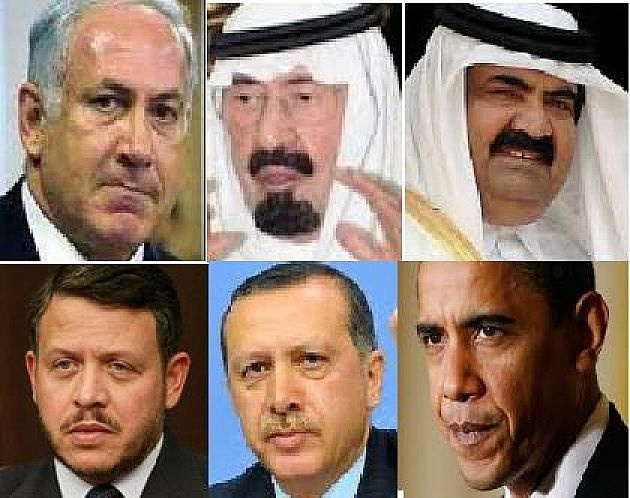Seven-Month Chance for Regional Countries

Finally, after several days of intensive negotiations, Iran and the P5+1 reached an agreement to extend the negotiations. This is while there were numerous speculations about a political or comprehensive agreement. But the measures taken by certain countries of the region caused the negotiators to agree on the extension of negotiations. The presence of Saud al-Faisal, Saudi Arabia’s Foreign Minister, in Vienna Airport and his meeting with John Kerry, Netanyahu’s phone conversation with Obama and also Erdogan’s meeting with Joe Biden, the US Vice President, indicate the efforts made by the Turkish-Arab-Israeli triangle to prevent an agreement in these negotiations.
Besides the letters written by the Republicans to Obama and also the issues proposed in the international scene, Saudi Arabia, Turkey and Israel would have certainly been damaged by such an agreement; Saudi Arabia would have politically been damaged by its regional influence, Turkey would have economically been damaged –considering its chaotic domestic economy – and the Zionist regime would have been damaged in its security. The Saudis represented the pressure groups in the trend of negotiations. Saud al-Faisal’s visit to Russia and his meeting with Putin and his trip to Vienna and his meeting with John Kerry in the airport and the measures taken by Saudi Arabia in the US Congress elections show the efforts made by Saudi rulers to prevent an agreement. Therefore, it seems that these three countries which form the triangle of opposition against an agreement demanded time from the P5+1 and the international community.
The Zionist regime needs time to strengthen its iron dome, Turkey seeks to reconstruct its economy – because in case of the lifting of sanctions against Iran and the restart of Iran’s financial trade with the world, Turkey would lose billions of dollars – and the Saudis need time to reestablish their relations with Iran and achieve solutions in the regional disputes. Right now, Saudi Arabia is involved in issues such as Lebanon’s presidency, the Bahrain crisis, Iraq and Syria’s developments and also the current conditions in Egypt and Libya. Thus, it needs to resolve these issues with Iran during several meetings. That is why the US and the western countries have accepted this issue and given time to these three governments to reach their objective within the next 7 months. The US’ demand of the Saudi officials to repair their relations with Iran could also be mentioned in this regard. All of these elements show that there have been serious obstacles and pressures in the path of reaching an agreement. Although Saudi Arabia is not a heavy weight which could create obstacles in the negotiations, it has a strong lobby. Saudi Arabia took this measure while representing the opposing countries. The presence of Saud al-Faisal in Vienna Airport and his meeting with John Kerry is also significant. He did not even reciprocate Zarif’s meeting on the sidelines of the UN General Assembly. It can perhaps be said that we will see developments in the relations between Iran and Saudi Arabia during the next seven months and Iran’s diplomacy will be directed towards the establishment of calm between Tehran and Riyadh and the grounds would be prepared for a strategic agreement between Iran and the P5+1.
The other point is that it is not only Saudi Arabia, Turkey and Israel which have taken steps on this path; other countries of the world, including Australia and Canada, were also present on the opposing side. But the logic of Iran’s diplomacy was able to stand against the expansive financial, propaganda, security and military front. One of the achievements of the negotiations during the last year was that countries supporting ISIS have now removed their support. We remember that when ISIS captured the city of Mosul, the Arab and western media stated that they were Iraqi revolutionaries which were on the sidelines during the Maleki administration and the Wahhabi, Saudi and Qatari Sheikhs openly participated in ISIS’ community prayers. But now nobody dares to express his support of this group. This shows the influence of the logic of the Islamic Republic of Iran and its impact on negotiations. This is more important than the agreement itself. They have to talk with Iran. The conditions have shown that Iran seeks dialogue and logic and is anti-terrorism. The big powers have also accepted this issue.
A look at Saudi Arabia’s position and its search for an opportunity to reconstruct its relations with Iran shows the significance of Iraq’s status. Following the coming to power of the al-Ebadi government, attempts were made to open the embassies and re-establish relations between Riyadh and Baghdad. Thus, it can perhaps be said that Iraq could act as a mediator between Iran and Saudi Arabia when its relations with Riyadh are established. Perhaps Kuwait’s role is more important than Iraq. Kuwait’s measures led to the visit made by Iran’s Foreign Minister to Saudi Arabia; Iraq cannot play such a role. Right now, the relations between Iraq and Saudi Arabia are not serious. Saudi Arabia seeks to reconstruct and revive its role in Iraq after the failure of its projects in this country. On the other hand, the Iraqi officials including al-Ebadi and Jafari cannot be trusted by the Saudis because the Saudis are aware of their close relations with Iran.
Iraq also attempts to bring itself out of its isolations from the Arab countries. That is why perhaps Kuwait is more suitable to act as a mediator. Among the western countries, Germany could also play this role. The Germans played a significant role in the exchange of the POWs between Hezbollah and the Zionist regime. Nonetheless, reconstruction of relations between Iran and Saudi Arabia during the next seven months could significantly help the reaching of an agreement.

